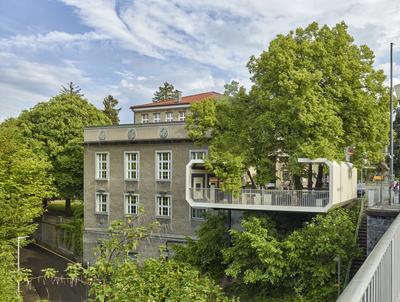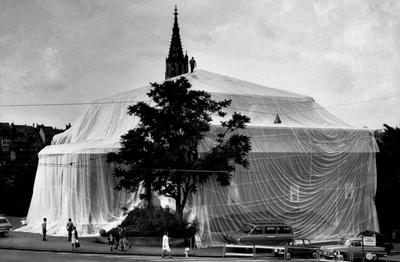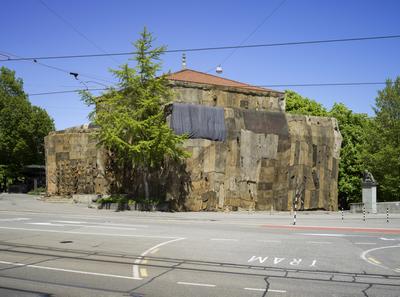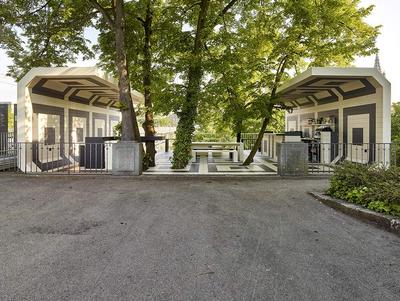Institution
Mission

Kunsthalle Bern owes its existence to the initiative taken by the Bernese Artists’ Society (GSMBA, Bern section) in 1918 and is one of the oldest Kunsthalle in Europe. We are an institution founded by artists and are thus dedicated first and foremost to showcase and promote artistic practices from Switzerland and beyond.
Our exhibitions, events and learning programmes offer opportunities for people to encounter, experience and participate in contemporary art that inspires, challenges and transforms. To fulfil our core mission of presenting contemporary art and theory, we organise exhibitions, commission art, publish and develop educational and collaborative initiatives and events.
Furthermore, the Kunsthalle Bern is an institution where outstanding curatorial practice flourishes and a space where seminal exhibitions were mounted and developed for more than a hundred years, making it an integral part of Swiss but also Western contemporary art history. Our archive plays a pivotal role in safeguarding this history.
Our program seeks to platform different perspectives on today’s social, cultural and political questions. Therefore, for us there is no space for, nor tolerance towards, hate speech or harassment of any kind. We are against ableism, ageism, anti-Muslim discrimination, anti-Semitism discrimination, or any other religious discrimination, gender discrimination, homophobia, racism, sexism, transphobia or xenophobia of any kind.
Vision
Kunsthalle Bern is a leading international contemporary art institution, presenting experimental, thought-provoking, groundbreaking exhibitions and informative and accessible public programmes and events. We practice kinship and care by making time and space for artists and cultural workers to speak about their ideas and the world. We engage our visitors by bridging conversations across our city and our communities.
For us art is a prism for better understanding the world and each other. While our program derives from the contemporary and contemplates the various futures of contemporary art, it also considers how art has been created and experienced in the past. The programme is anchored around not only the Western Canon but gives space to migrant and diasporic situated knowledges and their realities, in the hope that we offer visitors wider perspectives on how to think of culture and the world at large.
Learning for us is a porous process and we believe the institution expands beyond its walls, interacting with the environment that it is situated in. We aspire to do that through a collaborative way of working, and we are committed to promote diversity, equity and access for all, by being open to different perspectives, by spatializing and socializing different forms of knowledge, and hosting in ways that everyone feels welcome. Public engagement is intrinsic to our processes. Therefore, we are a space in which respect, generosity and a culture of sharing and conviviality is practiced daily.
For the next six years our focus will be to highlight practices that discuss environmental and social justice, so as to understand the art institution as a place of discussing and thinking of burning topics of contemporaneity. Inspired by the theory of permaculture, which operates as an umbrella for a symbiotic, care-full, holistic trajectory, our multi-year program emphasizes the importance of ecological justice and reparation, and we aim to highlight the critical role of arts and culture to imagine human and non-human relations anew.
Team and Board
Team
iLiana Fokianaki (she/her)
Artistic and Executive Director
Nino Baumgartner (he/him)
Facility Manager
Nya Bürki (they/them)
Production Manager
Rebecka Domig (she/her)
Communications & Community Relations
Claudia Heim (she/her)
Assistant Curator, Editions & Publications
Julia Jost (she/her)
Archive
Ursina Leutenegger (she/her)
Collective Learning
Gisela Stöckli (she/her)
Deputy Director
Hospitality Team
Anaïs Boogman (she/her)
Lea Fuhrer (she/her)
Avo*Anna Marcus (keine Pronomen)
Alizé Rose-May Monod (they/them)
Christoph Studer (he/him)
Max Zbinden (he/him)
Technical Team
Avo*Anna Marcus (they/them)
Rafael Käsermann (he/him)
Board
Board of Kunsthalle Bern
Lorenza Donati / Benjamin Dodell – Chair
Madeleine Amsler
Markus Gysi – Treasurer
Zainabu Jallo
Franz Krähenbühl – Delegate of BKG
Manuel Krebs
Karen Amanda Moser
Hannah Rocchi
Esther Schönenberger Bloch
Berit Seidel
Sereina Steinemann – Delegate of visarte.bern
Institutional History
"Overnight, Bern has become a city of art," the local newspaper Berner Tagwacht declared on 23.10.1918. The newspaper thus announced the founding of the Kunsthalle Bern, an initiative of the Bernese artists' association (GSMBA and GSBK, now visarte.bern).
Kunsthalle Bern achieved international fame early on with solo exhibitions of important artists such as Paul Klee, Alberto Giacometti, Meret Oppenheim, Jasper Johns, Sol LeWitt, Bruce Nauman and Daniel Buren, and with thematic exhibitions such as Harald Szeemann's When Attitudes Become Form – exhibitions that have helped write Western art history and continue to do so.
The Kunsthalle Bern proves to be a dynamic space for contemporary art with every exhibition. The institution cooperates with local institutions such as the HKB (Bern University of the Arts), the Institute of Art History at the University of Bern, the Arthouse Cinemas of the City of Bern, the Sommerakademie Zentrum Paul Klee, etc.
In 2025, an additional door was added to the garden side on the lower floor of the building. This was the first change to the facade since the foundation of Kunsthalle Bern in 1918. You can find more information on this project HERE.
Directors since 1918
- since 2024 iLiana Fokianaki
- 2022 – 2024 Kabelo Malatsie
- 2015 – 2022 Valérie Knoll
- 2012 – 2014 Fabrice Stroun
- 2005 – 2012 Philippe Pirotte
- 1997 – 2005 Dr. Bernhard Fibicher
- 1985 – 1997 Dr. Ulrich Loock
- 1982 – 1985 Jean-Hubert Martin
- 1974 – 1982 Johannes Gachnang
- 1970 – 1974 Dr. Carlo Huber
- 1961 – 1969 Dr. Harald Szeemann
- 1955 – 1961 Dr. Franz Meyer
- 1946 – 1955 Arnold Rüdlinger
- 1931 – 1946 Professor Dr. Max Huggler
- 1918 – 1930 Dr. Robert Kieser
The Kunsthalle is supported by the Kultur Stadt Bern, the Kunstfonds Bern and the Verein Kunsthalle Bern.


Kunsthalle Bar

The Kunsthalle Bar Module #5 was created by Lang/Baumann. The bar was built in 2018 on the occasion of the 100th anniversary of the Kunsthalle Bern and is operated during the warm months until the end of 2026 thanks to the permission of the city of Bern.
Module #5 is a walk-in sculpture and spatial extension of the Kunsthalle and refers to elements of the interior design of the original building. The outline with the bevelled corners is reminiscent of the floor plan of the main hall and the black and white patterned tiles create a reference to the former characteristic tiled floor of the entrance hall. The floating platform surrounds the large linden tree, creating an open and at the same time protected space that offers a panoramic view of the Aare and the old town.
Bar operation: taBerna, Stefan Ruprecht & Mike Hersberger.
The Kunsthalle Bar was made possible in 2018 through the generous support of the Culture City of Bern, Swisslos Kultur Kanton Bern, Burgergemeinde Bern, Blatter AG, Stanley Thomas Johnson Foundation, Ernst Göhner Foundation and Vitra Foundation.
Press
If you would like to receive regular press information about our exhibitions and events, please send an e-mail to press@kunsthalle-bern.ch or call +41 31 350 00 46. We will regularly send a press package and are happy to answer any additional questions.